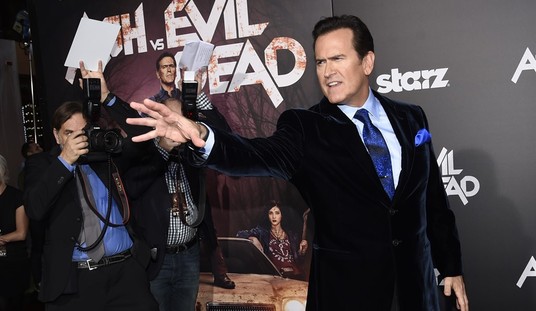Yesterday, the Department of Justice released two batches of indictments of ChiCom mega-conglomerate Huawei. The first deals with Huawei evading US sanctions on Iran:
A 13-count indictment was unsealed earlier today in federal court in Brooklyn, New York, charging four defendants,[1] including Huawei Technologies Co. Ltd. (Huawei), the world’s largest telecommunications equipment manufacturer, with headquarters in the People’s Republic of China (PRC) and operations around the world. The indicted defendants include Huawei and two Huawei affiliates — Huawei Device USA Inc. (Huawei USA) and Skycom Tech Co. Ltd. (Skycom) — as well as Huawei’s Chief Financial Officer (CFO) Wanzhou Meng (Meng).
The defendants Huawei and Skycom are charged with bank fraud and conspiracy to commit bank fraud, wire fraud and conspiracy to commit wire fraud, violations of the International Emergency Economic Powers Act (IEEPA) and conspiracy to violate IEEPA, and conspiracy to commit money laundering. Huawei and Huawei USA are charged with conspiracy to obstruct justice related to the grand jury investigation in the Eastern District of New York. Meng is charged with bank fraud, wire fraud, and conspiracies to commit bank and wire fraud.
The second deals with Huawei’s theft of trade secrets:
A 10-count indictment unsealed today in the Western District of Washington State charges Huawei Device Co., Ltd. and Huawei Device Co. USA with theft of trade secrets conspiracy, attempted theft of trade secrets, seven counts of wire fraud, and one count of obstruction of justice. The indictment, returned by a grand jury on January 16, details Huawei’s efforts to steal trade secrets from Bellevue, Washington based T-Mobile USA and then obstruct justice when T-Mobile threatened to sue Huawei in U.S. District Court in Seattle. The alleged conduct described in the indictment occurred from 2012 to 2014, and includes an internal Huawei announcement that the company was offering bonuses to employees who succeeded in stealing confidential information from other companies.
Today, the US formally requested the extradition of Huawei CFO Meng Wanzhou from Canada where she has been detained since arriving at Vancouver on December 1.
Canada said Tuesday it received a formal request from the U.S. for the extradition of Huawei Technologies Co.’s chief financial officer, Meng Wanzhou.
The formal extradition request comes after U.S. law-enforcement authorities unveiled Monday a sweeping set of criminal charges against Ms. Meng and Huawei. U.S. federal prosecutors accused Huawei of violating U.S. sanctions on Iran and of stealing trade secrets from a U.S. business partner, portraying the company as a serial violator of U.S. laws and global business practices.
Huawei was forced to pay a $4.7M claim to T-Mobile in 2017 for stealing trade secrets and violation of NDA’s. The first indictment covers the same ground. It is probably a first step in a more comprehensive ban on Huawei equipment. Already US government agencies are barred from purchasing Huawei for fear of compromising entire IT networks. Several nations have banned Huawei from their 5G networks for fear of technology theft. What much of the West sees as a natural reaction to the rapaciousness of Chinese companies and their sublime indifference to intellectual property, the Chinese see as a conspiracy to hurt Chinese companies:
Foreign Ministry spokesman Geng Shuang called on the United States to stop what he called its “unreasonable suppression” of Chinese companies including Huawei and treat them fairly and objectively.
“The U.S. has used its state power to discredit and pressure designated Chinese companies, attempting to throttle their ordinary legal operations. Behind all of this there are very strong political intentions and manipulations,” Geng said.
U.S. officials have denied there is any connection between the case and the ongoing trade dispute with Beijing, but President Trump previously said he could intervene in Meng’s case if it would benefit the United States’ national security interests or help secure a trade deal with China.
The second indictment is much more significant. Meng is politically connected, just as is her father who is the CEO of Huawei. That should go without saying because no Chinese executive holds his position without owing a debt to the Chinese government. All of them are highly connected political players. China is not happy at Meng’s detention:
Since Ms. Meng’s arrest, Chinese authorities have detained two Canadian nationals on national-security grounds, and a Chinese court this month sentenced another Canadian to death on drug-smuggling charges after a speedy retrial. Chinese officials have said the arrests and death sentence aren’t related to Ms. Meng’s arrest; former Canadian government and intelligence officials disagree, arguing they are part of China’s effort to force Canada to release Ms. Meng.
This is very similar to what the Russians have done in arresting US citizen Paul Whelan in retaliation for the imprisonment of Maria Butina.
While I think criminally prosecuting companies is fine — in fact, I’d like to see us haul a few German companies who are violating sanctions into federal court — I’m on record against using the US criminal code as a foreign policy instrument. I think this indictment, like the indictment of Russian intelligence officers behind the $100,000 in Facebook ads purchased during the 2016 election, is a horrible, terrible, good-for-nothing idea and it is going to start a cascading series of arrests of US citizens abroad in retaliation and it is going to do very little to change the behavior of either nations or companies owned by China’s ruling elite.
=========
=========
Like what you see? Then visit my story archive.
Follow @streiffredstate
I’m on Facebook. Drop by and join the fun there.
=========
=========














Join the conversation as a VIP Member